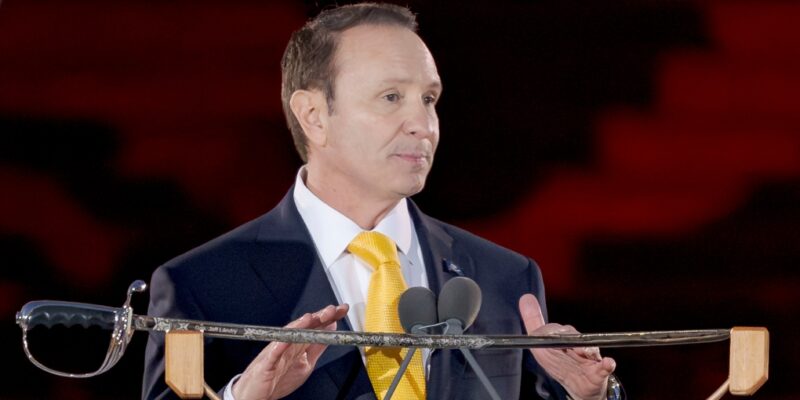In perhaps the only major rift that has developed between legislative Republicans and GOP Gov. Jeff Landry in their first year in this term of office, party lawmakers have turned up the heat on Landry over tort reform that influences vehicle insurance rates.
Backed by a good deal of trial lawyer money, Landry has appeared lukewarm on the issue of reform away from a legal structure weighed in favor of plaintiffs and the legal community that backs them. His most defiant move came in vetoing HB 423 by Republican state Rep. Mike Melerine this past session. That bill would have limited payouts by defendants to the actual amount of costs, plus up to 30 percent of the difference between the amount billed and the amount paid to plaintiff’s medical providers calculated from actual billing for insurance premiums and attorney fees, unless the defendant proves it to be unreasonable. Present law authorizes a flat 40 percent.
That bill actually represented a compromise. GOP state Sen. Alan Seabaugh had one which wasn’t heard that did away with paying out any difference at all, something neighboring Arkansas, Oklahoma, and Texas do, which is termed the collateral source rule. In his veto message of HB 423, Landry defended its presence on what he called its fairness in reimbursing foresight and advocacy, although the note didn’t address whether the current law created a fair framework for determining that amount possibly improved by the bill.
It is that concept which each chamber’s Insurance Committee put in the crosshairs in hearings this past week. At the joint meeting, legislators learned of a cottage industry that sprung up creating a structure facilitating the ability to inflate the value of billed past paid. Direct testimony described how that system worked and created upward pressure on rates.
Data backed that up. In a comparison of Alabama and Louisiana, two states with similar populations, total miles driven, and fatal accidents, Louisiana’s rate of accidents with bodily injury claims was 140 percent higher and payouts for such claims was double that of Alabama’s. This is the case even though Alabama’s general rule that paid only is the appropriate amount numerous common law exceptions appear in various individual courts weakening that.
The problem is compounded because increase litigation scares off competition. So, not only do inflated claims drive up rates, less competition puts less downward pressure on rates. And while rates have a number of factors beyond legislators’ control in their determinations, surely one reason why Louisiana’s rank at or near the top of all state average rates, and at twice or even three times that of some, is this legal environment.
That legislators produced a public forum to drive home these points – and have found a willing ally in Republican Insurance Commissioner Tim Temple – show they don’t plan on letting up the pressure for change even though the first round went to Landry. And it also signals that they will make this a bargaining chip with Landry, who has ambitious plans especially in the area of fiscal reform where there is much agreement between these parties.
That effort should kick off next month in a special session. But don’t be surprised even if not on that agenda that tort reform maneuverings won’t have an impact on that deep in the background.
Advertisement
Advertisement

